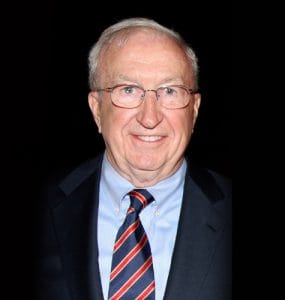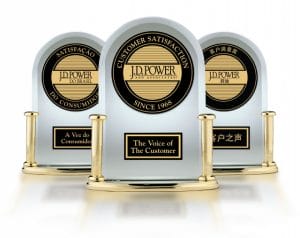Educated by Jesuits, John David Power graduated from the College of the Holy Cross in 1953, and joined the U.S. Coast Guard. He spent much of his time on the icebreaker USCGC Eastwind in the Arctic and Antarctic, and was briefly featured in a Disney film, Men Against the Arctic. After discharge, Power earned an MBA at Wharton using his G.I. benefits, and got a job doing customer research at Ford Motor Company. He married a gal who lived in his apartment building, but he was unhappy at Ford: he felt the company ignored customer satisfaction, which he felt was key to a company’s long-term success. Power left for a marketing firm that did research for General Motors, then did marketing research for farm equipment maker J.I. Case, and moved again for a stint in corporate planning for chainsaw and engine maker McCulloch. Power made one last career move in early 1968: he started his own company, J.D. Power & Associates — the “associates” initially being his wife, Julia, and their children. Their niche: customer satisfaction surveys. Their first client: Toyota’s forklift division. With Power’s knowledge of the automotive industry, that contract soon expanded to Toyota’s automotive division.

In 1972, reading customer satisfaction surveys, Julia Power discovered a flaw in Mazda rotary engines. The resulting press coverage catapulted the firm and its customer satisfaction rankings into public awareness — and, of course, the kinds of companies that were interested in their research. Subaru signed on, and used their high “J.D. Power & Associates” ranking in a Superbowl commercial in 1984, which solidified the J.D. Power reputation for ensuring quality and customer satisfaction. The children earned their keep as “associates”: when the company mailed out surveys, the kids taped shiny quarters to the surveys, which could be seen through a window in the envelope — those surveys were opened! Later, they used crisp dollar bills, but their surveys weren’t just opened, they were answered, providing the large amounts of data the company needed. Julia died from multiple sclerosis in 2002, and while Power remarried a year later, at age 69 his passion for the business was subdued. He sold the company in 2005 to McGraw Hill Financial, where it continues under his name (though they dropped the “& Associates”) with more than 800 employees. The automotive industry still remembered him: Power was inducted into the Automotive Hall of Fame in 2014.

The company worked in more than the automotive industry: it provided customer satisfaction data for companies in financial services, telecom (cable, cellular, local, and long distance telephone sectors), insurance, travel, home building, utilities, and healthcare. After retirement, Power turned his attention to philanthropy, giving $3 million to College of the Holy Cross to support its liberal arts program. The college used the funds to establish the J.D. Power Center for Liberal Arts in the World. He also taught marketing at California State University, Northridge. J.D. “Dave” Power III died January 23, at 89.
